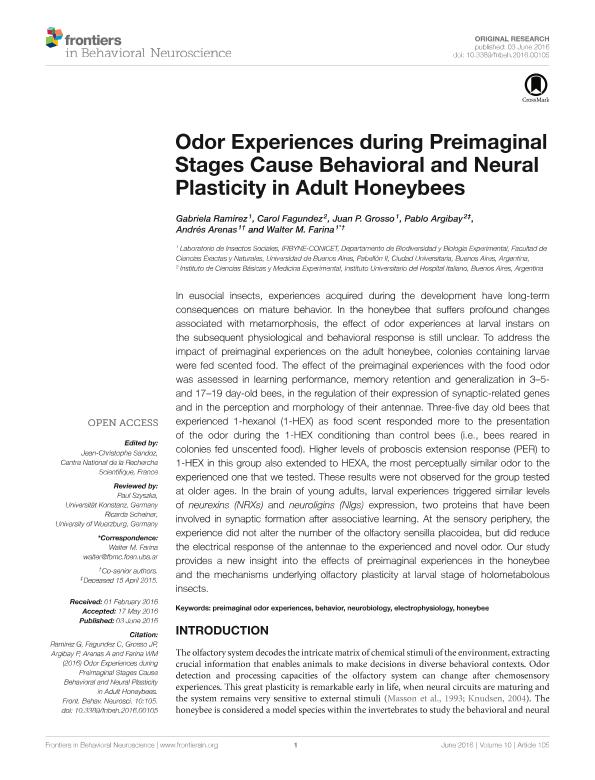Artículo
Odor experiences during preimaginal stages cause behavioral and neural plasticity in adult honeybees
Ramirez, Gabriela Paola ; Fagundez, Carol Betiana
; Fagundez, Carol Betiana ; Grosso, Juan Pedro
; Grosso, Juan Pedro ; Argibay, Pablo Francisco; Arenas, Andres
; Argibay, Pablo Francisco; Arenas, Andres ; Farina, Walter Marcelo
; Farina, Walter Marcelo
 ; Fagundez, Carol Betiana
; Fagundez, Carol Betiana ; Grosso, Juan Pedro
; Grosso, Juan Pedro ; Argibay, Pablo Francisco; Arenas, Andres
; Argibay, Pablo Francisco; Arenas, Andres ; Farina, Walter Marcelo
; Farina, Walter Marcelo
Fecha de publicación:
06/2016
Editorial:
Frontiers Media S.A.
Revista:
Frontiers in Behavioral Neuroscience
ISSN:
1662-5153
Idioma:
Inglés
Tipo de recurso:
Artículo publicado
Clasificación temática:
Resumen
In eusocial insects, experiences acquired during the development have long-term consequences on mature behavior. In the honeybee that suffers profound changes associated with metamorphosis, the effect of odor experiences at larval instars on the subsequent physiological and behavioral response is still unclear. To address the impact of preimaginal experiences on the adult honeybee, colonies containing larvae were fed scented food. The effect of the preimaginal experiences with the food odor was assessed in learning performance, memory retention and generalization in 3–5- and 17–19 day-old bees, in the regulation of their expression of synaptic-related genes and in the perception and morphology of their antennae. Three-five day old bees that experienced 1-hexanol (1-HEX) as food scent responded more to the presentation of the odor during the 1-HEX conditioning than control bees (i.e., bees reared in colonies fed unscented food). Higher levels of proboscis extension response (PER) to 1-HEX in this group also extended to HEXA, the most perceptually similar odor to the experienced one that we tested. These results were not observed for the group tested at older ages. In the brain of young adults, larval experiences triggered similar levels of neurexins (NRXs) and neuroligins (Nlgs) expression, two proteins that have been involved in synaptic formation after associative learning. At the sensory periphery, the experience did not alter the number of the olfactory sensilla placoidea, but did reduce the electrical response of the antennae to the experienced and novel odor. Our study provides a new insight into the effects of preimaginal experiences in the honeybee and the mechanisms underlying olfactory plasticity at larval stage of holometabolous insects.
Archivos asociados
Licencia
Identificadores
Colecciones
Articulos(IFIBYNE)
Articulos de INST.DE FISIOL., BIOL.MOLECULAR Y NEUROCIENCIAS
Articulos de INST.DE FISIOL., BIOL.MOLECULAR Y NEUROCIENCIAS
Articulos(OCA PQUE. CENTENARIO)
Articulos de OFICINA DE COORDINACION ADMINISTRATIVA PQUE. CENTENARIO
Articulos de OFICINA DE COORDINACION ADMINISTRATIVA PQUE. CENTENARIO
Citación
Ramirez, Gabriela Paola; Fagundez, Carol Betiana; Grosso, Juan Pedro; Argibay, Pablo Francisco; Arenas, Andres; et al.; Odor experiences during preimaginal stages cause behavioral and neural plasticity in adult honeybees; Frontiers Media S.A.; Frontiers in Behavioral Neuroscience; 10; 105; 6-2016; 1-14
Compartir
Altmétricas



